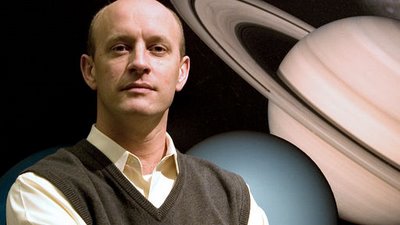
- This event has passed.
Dr. Michael Ward, Senior Research Fellow, Blackfriars Hall, University of Oxford

Date
April 4, 2013 at 6:30 PM EDT
Location
Klarman Hall Auditorium
* CLICK HERE TO LINK TO LIVESTREAM
“the foremost living Lewis scholar” – N.T. Wright
Although he was a literary historian, not a scientist or a theologian, C.S. Lewis has much to say of interest regarding the interface between science and religion because of his scholarly study of the sixteenth century and, in particular, of the imaginative effects of the Copernican revolution. He regards science, properly speaking, as a subset of religion. He believes science to be a fundamentally imaginative enterprise. He argues that scientific statements, because they tend to be univocal and strive to be verifiable, are actually rather small statements, all things considered. He argues that there is always a mythology that follows in the wake of science and that both scientists and non-scientists should take care not to put excessive weight on particular scientific metaphors. We should hold our scientific paradigms with a due provisionality, because new evidence may always turn up to overthrow those paradigms. Even the best and most long-lasting paradigm is merely a lens or linguistic stencil laid over reality, not reality itself. This humility in relation to the facts about the physical universe is a virtue similar to the one we should exercise before the mystery of God.
Dr Michael Ward is a Senior Research Fellow of Blackfriars Hall in the University of Oxford and, according to the Times Literary Supplement, is “the foremost living Lewis scholar”. He is the co-editor of The Cambridge Companion to C.S. Lewis (Cambridge University Press, 2010) and the author of Planet Narnia: The Seven Heavens in the Imagination of C.S. Lewis (Oxford University Press, 2008), a ground-breaking study which became the subject of a BBC television documentary [see below]. Dr Ward read English at Oxford, Theology at Cambridge, and has a PhD from St Andrews. His main claim to fame, however, is that he handed a pair of x-ray specs to James Bond in the movie The World Is Not Enough.
Planet Narnia: The Seven Heavens in the Imagination of C.S. Lewis (Oxford University Press, 2008), was the subject of a 2009 BBC television documentary called The Narnia Code:
![]()
Lecture Respondent:
Stephanie Gehring is a partial native of Portland, Oregon, and of various German towns.
She holds an MFA in poetry from Cornell, recently fell in love with the Book of Kells
through the lovely animated film The Secret of Kells, and is currently beginning doctoral work
in aesthetics and ethics through Duke’s Graduate Program in Religion. Among her favorite
things are improv comedy, Argentine tango, and reading good books while going on long
walks (which requires less coordination than you might think).
Co-sponsored with the Cornell Catholic Community.
